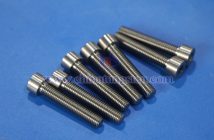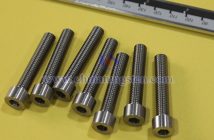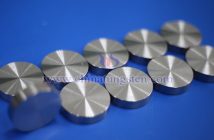In the field of industrial fasteners, tungsten alloy screws and titanium alloy screws, as two high-performance material products, hold significant positions in various application scenarios due to their unique physicochemical properties. There are notable differences between the two in terms of material characteristics, performance, manufacturing processes, and application contexts.
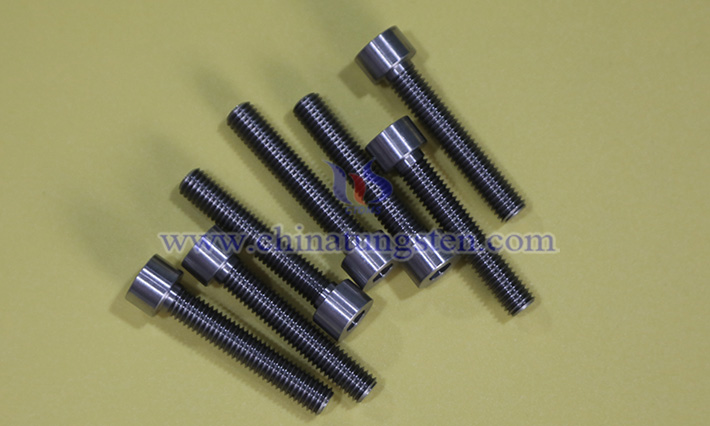
I. Performance Comparison of Tungsten Alloy Screws and Titanium Alloy Screws
Tungsten alloy screws use high-purity tungsten as the base material, supplemented with binder phases such as nickel, copper, or iron, achieving a density of 16.5–18.5 g/cm3—approximately 3.5–4 times that of titanium alloys (about 4.5 g/cm3). This high density endows tungsten alloy screws with excellent counterweight capabilities and impact resistance. The tensile strength of tungsten alloys can reach 900–1200 MPa, with a hardness of HRC 25–35, showcasing outstanding mechanical properties. In contrast, titanium alloy screws, formed by adding elements like aluminum and vanadium to create an α+β phase structure, offer a specific strength (strength-to-density ratio) far exceeding that of tungsten alloys, providing mechanical performance close to high-strength steel at the same weight. Titanium alloys, with their lower density, are the preferred choice for lightweight designs.
Tungsten alloy screws perform exceptionally well in high-temperature environments. With a base metal melting point of 3,422°C, they retain approximately 70%–80% of their room-temperature strength at high temperatures and exhibit strong oxidation resistance, making them suitable for scenarios such as aviation engine turbines or nuclear reactor high-temperature components. Titanium alloy screws, however, have relatively limited high-temperature resistance; their strength significantly decreases in high-temperature environments, and they are prone to oxidation embrittlement, thus being more suitable for locations with generally lower temperatures.
While tungsten alloy screws offer good chemical stability, their corrosion rate in salt spray or strong acid environments is higher than that of titanium alloys, resulting in slightly inferior corrosion resistance. This requires additional surface coatings (e.g., nickel or chrome) to enhance protection. Titanium alloy screws, due to the formation of a dense TiO? oxide film on their surface, exhibit a lower corrosion rate in seawater, chloride solutions, and most acidic media (except hydrofluoric acid).
Due to their high density, tungsten alloy screws possess excellent radiation shielding performance, effectively absorbing gamma rays and neutron radiation, and are widely used in nuclear industry shielding structure fastening. Titanium alloys, with their lower density, have weaker radiation shielding capabilities, limiting their use in nuclear environments.
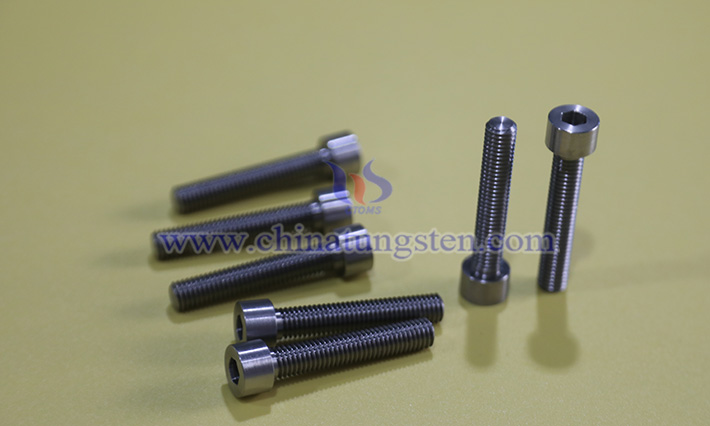
II. Application Comparison of Tungsten Alloy Screws and Titanium Alloy Screws
Aerospace: Tungsten alloy screws are used in high-temperature, high-pressure environments, such as rocket engine combustion chambers or radiation shielding components in nuclear-powered spacecraft, leveraging their high-temperature resistance and radiation protection advantages. Titanium alloy screws, with their lightweight properties and high specific strength, are widely used for connections in aircraft fuselages, wings, and satellite housings to meet weight reduction needs.
Military Equipment: Tungsten alloy screws, due to their high density and impact resistance, are commonly used for securing armor-piercing projectile cores or heavy-duty connections in armored vehicles. Titanium alloy screws, with their corrosion resistance and lightweight characteristics, are applied in fastening submarine hulls, ship decks, and other marine environments.
Civilian Applications: Tungsten alloy screws play a role in niche areas, such as counterweight modules for esports equipment or high-density fastening in precision instruments. Titanium alloy screws, benefiting from cost advantages and biocompatibility, dominate markets for medical devices (e.g., orthopedic implants) and high-end sports equipment.

